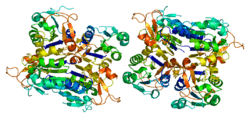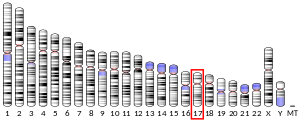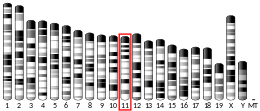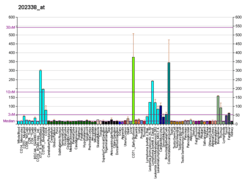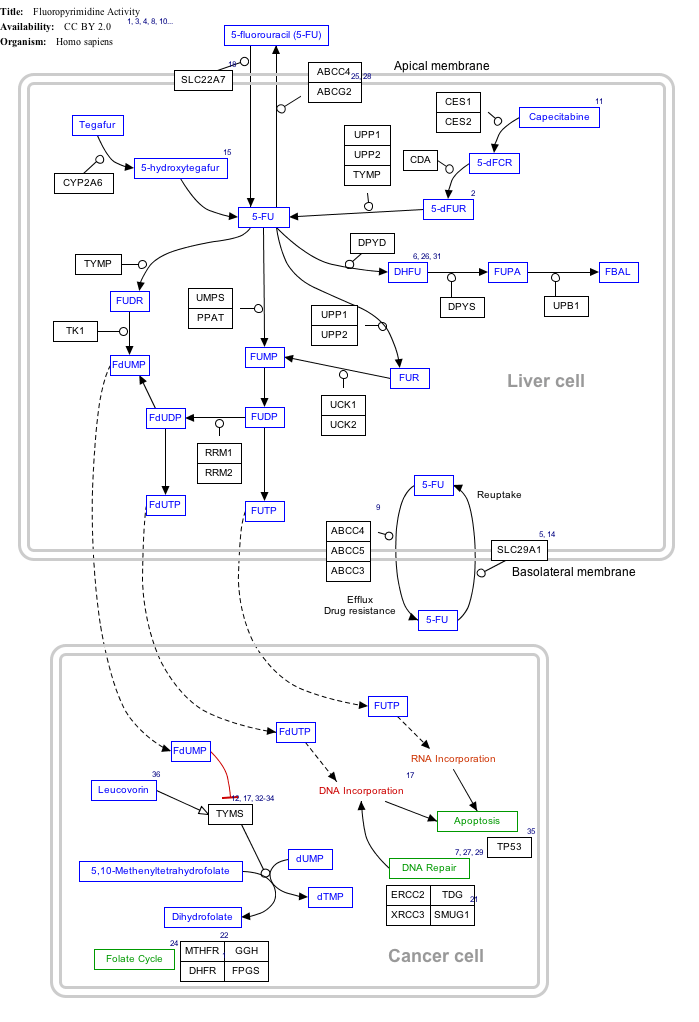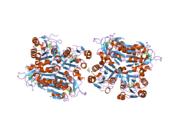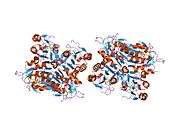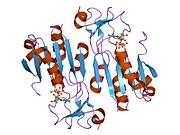Thymidine kinase 1
Thymidine kinase 1, soluble (gene name TK1), is a human thymidine kinase.[5]
Two forms of this protein have been identified in animal cells, one in cytosol and one in mitochondria. Activity of the cytosolic enzyme is high in proliferating cells and peaks during the S-phase of the cell cycle; it is very low in resting cells.
Interactive pathway map
Click on genes, proteins and metabolites below to link to respective articles.[§ 1]
- The interactive pathway map can be edited at WikiPathways: "FluoropyrimidineActivity_WP1601".
Thymidine Kinase 1 in Cancer
Thymidine kinase has been making a growing impact in the cancer research community. It has been found that elevated blood serum levels of TK-1 are associated the presence of many types of malignancy, furthermore, TK-1 has been found to be elevated in serum even before clinical symptoms appear.[7] This offers the potential for earlier therapy. Elevations in serum TK-1 have been found to correlate with the return of breast and other forms of cancer[8] TK-1 can be used to detect cancer earlier, determine what stage it is in, and detect recurrence. Thymidine Kinase 1 can be measured based on its enzyme activity[9] or using immunoassay.[10]
References
- GRCh38: Ensembl release 89: ENSG00000167900 - Ensembl, May 2017
- GRCm38: Ensembl release 89: ENSMUSG00000025574 - Ensembl, May 2017
- "Human PubMed Reference:". National Center for Biotechnology Information, U.S. National Library of Medicine.
- "Mouse PubMed Reference:". National Center for Biotechnology Information, U.S. National Library of Medicine.
- "Entrez Gene: Thymidine kinase 1, soluble".
- Huang DY, Chang ZF (June 2001). "Interaction of human thymidine kinase 1 with p21(Waf1)". Biochem. J. 356 (Pt 3): 829–34. doi:10.1042/0264-6021:3560829. PMC 1221910. PMID 11389691.
- Alegre MM, Robison RA, O'Neill KL (May 2013). "Thymidine Kinase 1: A Universal Marker for Cancer". Cancer and Clinical Oncology. 2 (1). doi:10.5539/cco.v2n1p159.
- Alegre MM, Robison RA, O'Neill KL (2012). "Thymidine kinase 1 up-regulation is an early event in breast tumor formation". Journal of Oncology. 2012: 575647. doi:10.1155/2012/575647. PMC 3388419. PMID 22778736.
- Munch-Petersen B (2005). "Differences in the kinetic properties of thymidine kinase isoenzymes in unstimulated and phytohemagglutinin-stimulated human lymphocytes". Mol. Cell. Biochem. 64 (2): 1013–19. PMID 6504022.
- He Q, Zhang P, Zou L, et al. (2005). "Concentration of thymidine kinase 1 in serum (S-TK1) is a more sensitive proliferation marker in human solid tumors than its activity". Oncol. Rep. 14 (4): 1013–19. PMID 16142366.
Further reading
- Kim YK, Lee AS (1992). "Identification of a protein-binding site in the promoter of the human thymidine kinase gene required for the G1-S-regulated transcription". J. Biol. Chem. 267 (4): 2723–7. PMID 1370831.
- Barik S, Banerjee AK (1991). "Cloning and expression of the vesicular stomatitis virus phosphoprotein gene in Escherichia coli: analysis of phosphorylation status versus transcriptional activity". J. Virol. 65 (4): 1719–26. PMC 239976. PMID 1848304.
- Sadava D, Bernard B (1990). "Transition from cytosolic to mitochondrial thymidine kinase during development in human fetal tissues". Life Sci. 47 (25): 2359–64. doi:10.1016/0024-3205(90)90275-V. PMID 2263164.
- Tamiya N, Yusa T, Yamaguchi Y, Tsukifuji R, Kuroiwa N, Moriyama Y, Fujimura S (1989). "Co-purification of thymidylate kinase and cytosolic thymidine kinase from human term placenta by affinity chromatography". Biochim. Biophys. Acta. 995 (1): 28–35. doi:10.1016/0167-4838(89)90229-X. PMID 2538159.
- Slagel V, Flemington E, Traina-Dorge V, Bradshaw H, Deininger P (1987). "Clustering and subfamily relationships of the Alu family in the human genome". Mol. Biol. Evol. 4 (1): 19–29. PMID 3128713.
- Flemington E, Bradshaw HD, Traina-Dorge V, Slagel V, Deininger PL (1987). "Sequence, structure and promoter characterization of the human thymidine kinase gene". Gene. 52 (2–3): 267–77. doi:10.1016/0378-1119(87)90053-9. PMID 3301530.
- Sherley JL, Kelly TJ (1988). "Human cytosolic thymidine kinase. Purification and physical characterization of the enzyme from HeLa cells". J. Biol. Chem. 263 (1): 375–82. PMID 3335503.
- Kreidberg JA, Kelly TJ (1986). "Genetic analysis of the human thymidine kinase gene promoter". Mol. Cell. Biol. 6 (8): 2903–9. PMC 367858. PMID 3785218.
- Bradshaw HD, Deininger PL (1984). "Human thymidine kinase gene: molecular cloning and nucleotide sequence of a cDNA expressible in mammalian cells". Mol. Cell. Biol. 4 (11): 2316–20. PMC 369060. PMID 6549046.
- Kuo WL, Hirschhorn R, Huie ML, Hirschhorn K (1996). "Localization and ordering of acid alpha-glucosidase (GAA) and thymidine kinase (TK1) by fluorescence in situ hybridization". Hum. Genet. 97 (3): 404–6. doi:10.1007/BF02185782. PMID 8786092.
- Chang ZF, Huang DY, Chi LM (1998). "Serine 13 is the site of mitotic phosphorylation of human thymidine kinase". J. Biol. Chem. 273 (20): 12095–100. doi:10.1074/jbc.273.20.12095. PMID 9575153.
- Berenstein D, Christensen JF, Kristensen T, Hofbauer R, Munch-Petersen B (2000). "Valine, not methionine, is amino acid 106 in human cytosolic thymidine kinase (TK1). Impact on oligomerization, stability, and kinetic properties". J. Biol. Chem. 275 (41): 32187–92. doi:10.1074/jbc.M005325200. PMID 10924519.
- Huang DY, Chang ZF (2001). "Interaction of human thymidine kinase 1 with p21(Waf1)". Biochem. J. 356 (Pt 3): 829–34. doi:10.1042/0264-6021:3560829. PMC 1221910. PMID 11389691.
- Fujiwaki R, Hata K, Moriyama M, Iwanari O, Katabuchi H, Okamura H, Miyazaki K (2001). "Clinical value of thymidine kinase in patients with cervical carcinoma". Oncology. 61 (1): 47–54. doi:10.1159/000055352. PMID 11474248.
- Fujiwaki R, Hata K, Nakayama K, Moriyama M, Iwanari O, Katabuchi H, Okamura H, Sakai E, Miyazaki K (2002). "Thymidine kinase in epithelial ovarian cancer: relationship with the other pyrimidine pathway enzymes". Int. J. Cancer. 99 (3): 328–35. doi:10.1002/ijc.10319. PMID 11992400.
- Mao Y, Wu J, Wang N, He L, Wu C, He Q, Skog S (2002). "A comparative study: immunohistochemical detection of cytosolic thymidine kinase and proliferating cell nuclear antigen in breast cancer". Cancer Invest. 20 (7–8): 922–31. doi:10.1081/CNV-120005905. PMID 12449723.
- Gilles SI, Romain S, Casellas P, Ouafik L, Fina F, Combes T, Vuaroquaux V, Seitz JF, Bonnier P, Galiègue S, Carayon P, Martin PM (2003). "Mutation analysis in the coding sequence of thymidine kinase 1 in breast and colorectal cancer". Int. J. Biol. Markers. 18 (1): 1–6. PMID 12699056.
- Han T, Fernandez M, Sarkar M, Agarwal RP (2004). "2', 3'-Dideoxycytidine represses thymidine kinases 1 and 2 expression in T-lymphoid cells". Life Sci. 74 (7): 835–42. doi:10.1016/j.lfs.2003.07.023. PMID 14659972.
- Li CL, Lu CY, Ke PY, Chang ZF (2004). "Perturbation of ATP-induced tetramerization of human cytosolic thymidine kinase by substitution of serine-13 with aspartic acid at the mitotic phosphorylation site". Biochem. Biophys. Res. Commun. 313 (3): 587–93. doi:10.1016/j.bbrc.2003.11.147. PMID 14697231.
- ONeill KL, Buckwalter M, Murray BK (2001). "Thymidine kinase: diagnostic and prognostic potential". Expert Rev. Mol. Diagn. 1 (4): 428–33. doi:10.1586/14737159.1.4.428. PMID 11901857.
- Topolcan O, Holubec Jr L (2008). "The role of thymidine kinase in cancer diseases". Expert Opin. Med. Diagn. 2 (2): 129–41. doi:10.1517/17530059.2.2.129. PMID 23485133.
- Jagarlamudi KK, Shaw M (2018). "Thymidine Kinase 1 as a Tumor Biomarker: Technical Advances offer New Potential to an Old Biomarker". Biomark. Med. 12 (9): 1035–48. doi:10.2217/bmm-2018-0157. PMID 30039979.
